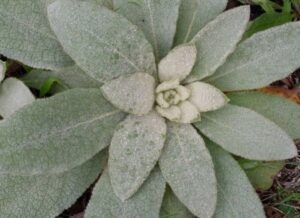Make Your Own Lung-Healing Herbal Tea with Mullein

Mullein is a common weed prominent all over the United States, often found along stretches of the highway, on the edges of forests and on the gravely sides of railroad tracks. But this plant is much more than a bit of roadside greenery, as it may assist in the recovery of several common conditions within it its fuzzy, pale green leaves and yellow rosettes. Originally used by the natives in several parts of the United States, this plant is still used because of its, beneficial effects on the respiratory system. Assisting with common ailments such as coughing, lung weakness, respiratory constriction and chest colds, the mullein plant is truly a lung healing herb.
Known as Verbascum thapsus, its Latin name, mullein is considered beneficial for the lungs because it is an expectorant. This means that the herb may help the body remove excess mucus from lungs and soothes the mucus membranes with its emollient properties. It is therefore excellent for helping with the relief of bronchitis, heavy coughing, chest colds and even asthma. Both the leaves and the flowers of the plant contain saponins, natural detergents which make a cough more productive in releasing and expelling phlegm from the walls of the lungs, and mucilage, a gelatinous substance which soothes any irritated membrane.
Dried mullein leaves, flowers and roots can all be used to heal these lung abating conditions. A mullein tea is the most common method of preparing the herb and the recipe below makes one cup of tea, which can be consumed up to 3 times a day. Gargling the tea once it has cooled down is very effective for coughing and soreness in the throat.
Mullein Tea
Ingredients
1 ½ cups boiling water
1-2 teaspoons dried mullein leaves and/or flowers (flowers make a sweeter tea)
1 teaspoon dried spearmint (optional for flavor)
1-2 teaspoons honey (optional)
Method
Steep the mullein leaves in hot water inside a tea ball or strainer for 15 minutes. Add honey if you like a sweeter tea.
If the flavor of mullein doesn’t agree with you, another great way to reap its benefits is by preparing an inhalant. To do this, boil the leaves in water for 5 minutes and inhale the steam to relieve coughs, congestion and asthma. Mullein can fight asthma and keep away colds because it actually prevents infections from settling into the delicate respiratory tissue by curing dryness and constriction. Rather ironically, mullein can also be smoked, thus rendering itself the only type of cigarette that could be considered beneficial in treating lung conditions.
Mullein is primarily a respiratory herb, although its benefits reach much further than our lungs. The herb is a diuretic and thus can relieve urinary tract inflammation when taken through a tea. It can also be used to decrease inflammation in the bowels, helping to reduce colitis and other issues. Mullein extract infused with olive oil has been used to reduce the inflammation of earaches, sore joints, insect bites and hemorrhoids because of its soothing properties. Simple poultices made out of fresh, mashed mullein leaves and flowers mixed with water can also be used to relieve, burns, boils and sores.
Mullein Products
- Mountain Rose Herbs offers mullein oil, tinctures, dried leaves and dried flowers so that you can make your own fresh teas and infusions.
- Richters sells dried flowers and leaves, extracts and seeds so that you can sow some in your own yard for the coming season.
- Celebration Herbals offers a mullein tea made of the plant’s leaves, which are certified organic and guaranteed to soothe your lungs. One tea box contains 24 tea bags.
- Garden of Cures makes an organic mullein salve with beeswax, coconut oil and Vitamin E for topical use as an instant pain reducer in the case of cuts, burns, boils and hemorrhoids.
NOTE: Do not ingest mullein seeds, as they are mildly toxic! Mullein leaves have fine hairs that can irritate some people’s skin and cause rashes. If you have very sensitive skin, use gloves when preparing teas, tinctures, extracts or poultices from mullein leaves and long sleeves when harvesting the plant. Always consult with your primary care physician before adding herbs to your diet, particularly if you are taking prescription medications.
Related on Organic Authority
6 All Natural Immune Boosters
8 Trusted CBD Brands that Source Organic Hemp and Provide Third Party Testing
The Complete Guide to Healing Medicinal Mushrooms
Image: John Tann

